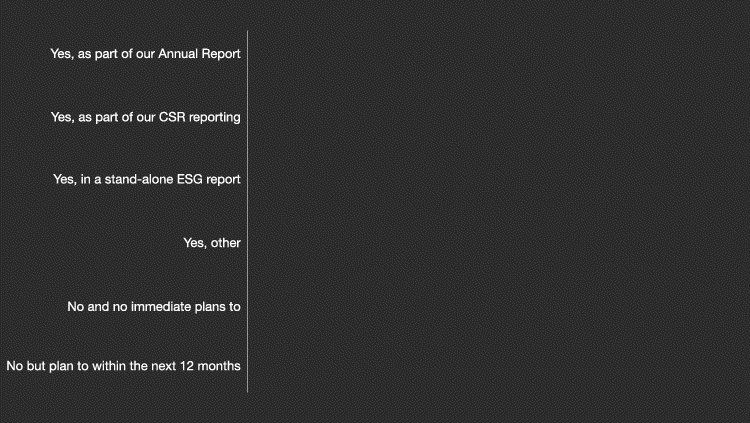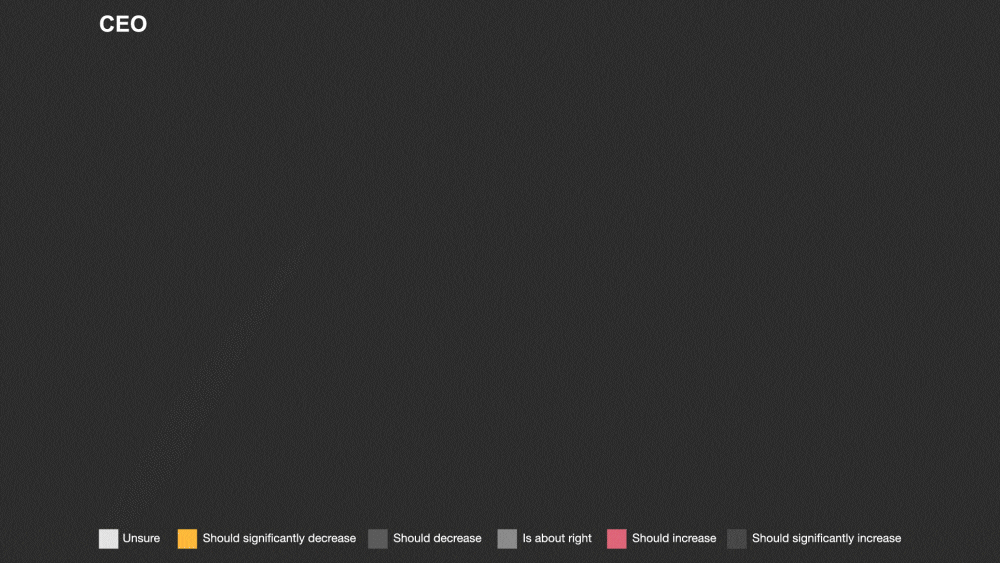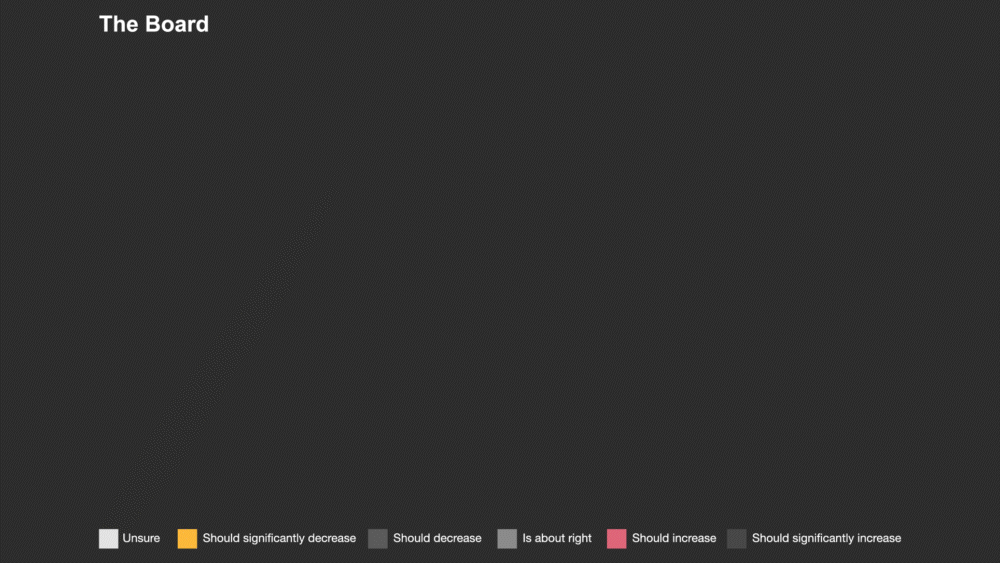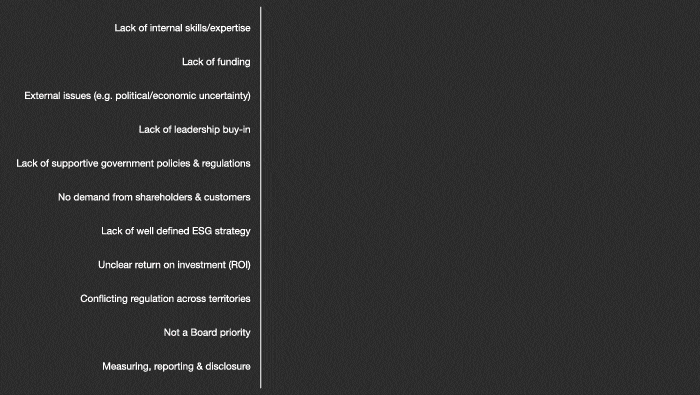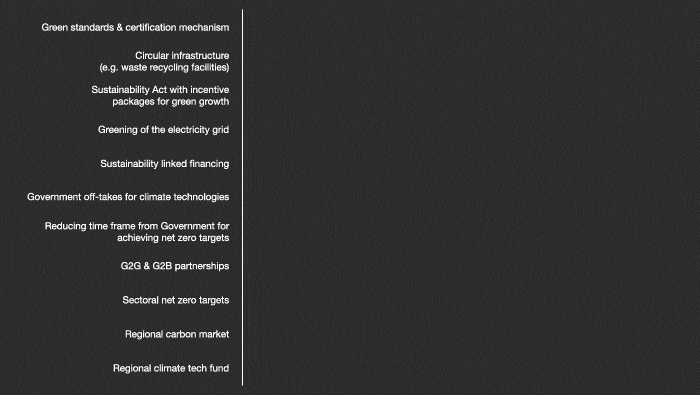There has been a seismic shift in progress on ESG
64% of respondents have adopted a formal ESG strategy in the last 12 months and many are embedding ESG priorities across their organisations.
of respondents surveyed have adopted a formal ESG strategy and the number of companies without a strategy has fallen in the last 12 months
of survey respondents have made a carbon-neutral commitment or are working towards one
of respondents want their organisation's CEO and Board to increase the time they allocate to ESG-related issues
of the organisations are self-funding their ESG activities rather than looking to more innovative green financing opportunities
respondents hope COP28 will lead to governments improving ESG infrastructure and providing incentives for green growth
In our second year of conducting this research in the region, the key findings of the PwC 2023 report on environmental, social, and governance (ESG) issues in the Middle East zone in on the “E” pillar, related to the environment. They highlight the continuing progress that companies are making to ensure their strategy, operations and processes are more sustainable, even as they indicate the road still to travel.
Heightened awareness of climate risk to business, coupled with new regulation, has driven the embedding of ESG in the strategy of more than six in ten companies in the region, with the focus now increasingly shifting to execution. And we are seeing a shift in perception from public and private sector leadership about the importance of ESG, with more organisations than ever before appointing a dedicated resource to handle this agenda at the executive level.
In short, this year’s PwC ESG Middle East report serves as a progress card on the growth of sustainability in the region. Ahead of COP28, companies are playing their part in implementing ESG measures, but also signalling the need for practical support so that they can move faster. With the right coordinated response from governments, 2023 could be the region’s most environmentally transformative year yet.
Dr Yahya Anouti
PwC Middle East ESG Leader
Partner, Strategy& Energy, Utilities & Resources Practice
64% of respondents have adopted a formal ESG strategy in the last 12 months and many are embedding ESG priorities across their organisations.
More than 60% of businesses want leadership to increase the time they allocate to ESG-related issues, with risk management, compliance, and leveraging the circular economy featuring as top priorities for the year ahead.
Only 13% of businesses are accessing sustainable finance and challenges remain with an ongoing green skills gap.
The signal to governments to take serious action on ESG is sounding loud and clear. More than one-third of companies we surveyed hope COP28 will lead to ESG legislation and incentives for green growth.
Global - December 2015: COP21, signing of the Paris Agreement
Global - 2016: Solar electricity & wind power become economically competitive with fossil fuels in some regions
Regional - December 2016: The Qatar Stock Exchange releases ESG guidelines
Regional - June 2020: Bahrain Bourse issues ESG reporting guidelines
Regional - September 2020: Egypt is the first Middle East country to issue a green sovereign bond, for $500m
Regional - 2021: Launch of the Saudi Green Initiative & the Middle East Green Initiative - long-term sustainable action plans which aims to address climate change, reduce emissions & increase the use of clean energy in KSA
Regional - January 2021: UAE introduces non-mandatory sustainability reporting requirements for companies
Global - August 2021: IPCC 6th Assessment Report
Regional - October 2021: Official announcements of net-zero commitments by KSA, UAE, Qatar & Bahrain
Global - November 2021: COP26, Glasgow, prompts national commitments to net-zero emissions
Regional - November 2021: Saudi Exchange publishes ESG disclosure guidelines
Regional - October 2022: Oman announces National Net Zero plan & a green hydrogen strategy that seeks to create 70,000 jobs
Regional - October 2022: Saudi PIF $3bn green fund announcement
Regional - October 2022: Saudi Aramco $1.5bn sustainability fund announced
Global - November 2022: COP27, Sharm El Sheikh, first of two COP conferences in the Middle East
Regional - November 2022: UAE & the United States announce $100bn clean energy partnership
Regional - October 2023: MENA Climate Week
Global - November 2023: COP28, Dubai, second COP conference in the Middle East
The first PwC ESG Middle East report in 2022 showed that ESG adoption and understanding in the region was at an early stage of development, with only 18% of respondents saying their companies had teams and the systems in place to cover the full remit of ESG functions.1
This year we see clear and specific signs of progress. The first is that ESG-related issues have become so embedded in many companies that they have developed specific roles to execute against their ESG strategy. More than one-quarter (27%) now have a Chief Sustainability Officer (CSO) in place, and in almost half of those companies, the CSO has the primary responsibility for ESG. This represents a shift from our 2022 findings where some 55% of respondents stated that it was the CEO who had overall control of ESG - this year, that figure has dropped to just 20% as CSOs assume ESG leadership.
This more organised, institutional effort is a sign of growing ESG maturity in the region: indeed, other research from Strategy& has shown that 98% of companies with an A rating for ESG have an executive who is specifically responsible for sustainability.2
The second sign of progress comes with the fact that the share of companies with a formal ESG strategy in the region continues to rise, with almost two-thirds (64%) now saying they have a strategy in place. The number of companies still waiting to act has declined sharply: whereas 16% of respondents in last year’s survey said their company had no ESG strategy this year, that figure has dropped to just 7%.
Third, we see that 70% of respondents now say that their company reports on ESG, and one-quarter do so in a stand-alone ESG report (Exhibit 1). Of those who are reporting, 59% state that their reporting is formally audited or assured, and a further 25% plan to take that step in the next year.
Question: Does your organisation report on ESG in any of the following ways?
Exhibit 1
Note: In some questions respondents were able to select more than one answer, so figures may not add up to 100%.
This trend highlights the growing regulatory pressures on companies to put in place ESG reporting across the Middle East. For example, the majority of stock exchanges and regulators in the region, including the Abu Dhabi Securities Exchange and Dubai Financial Market, have issued guidance on reporting sustainability information.3 Such stipulations are in line with major reporting requirements being introduced globally, notably in the European Union, which has introduced the Corporate Sustainability Reporting Directive that requires extensive reporting on sustainability issues for companies with more than 500 employees. And in the United States, the Securities and Exchange Commission has proposed new rules - still under discussion - that will mandate climate-related reporting for public companies.4
Organisations in the Middle East are reacting accordingly when it comes to this increasing guidance on sustainability reporting and regulatory pressure: respondents to our survey said that complying with regulations is the single most important factor for adopting ESG strategies, followed by the desire to contribute to national decarbonisation strategies and aligning with corporate values and culture (Exhibit 2).
Question: Which of the following factors do you believe are the most important reason(s) for adopting or progressing an ESG strategy within your organisation?
Exhibit 2
Note: In some questions respondents were able to select more than one answer, so figures may not add up to 100%.
Fazil Abdul Rahiman, VP Sustainability & Climate Change, Abu Dhabi National Energy Company (TAQA)
There is a growing pressure from investors and banks to factor ESG considerations into capital allocation and decision making.
The final indication of growing ESG maturity among organisations in the Middle East region can be indicated by the number of ESG-specific areas that fall under the remit of the ESG leader in a company.
Key hallmarks of good ESG practice include:
Across all six of these areas, survey respondents this year were significantly more engaged, most notably, in strategy (Exhibit 3). Here, with about one-third of respondents said that all six of these areas fell under the remit of the company’s ESG leader, compared to just 18% last year.
Question: Which of the following activities fall under the person responsible for leading ESG in your organisation?
Exhibit 3
The Middle East findings of our 26th CEO survey, published in January 2023, gives a clearer idea of what these broad themes mean in practice. That survey showed half of regional CEOs have either taken steps to mitigate climate risk or are in the process of doing so, both by innovating new and climate-friendly products and processes and cutting emissions.5
Vijay Bains, Chief Sustainability Officer, Group Head of ESG, Emirates NBD
A lot of our clients are saying: ‘How can you help us on our sustainable finance journey?’ That's the first driver. The second one is that we're being asked what we, as a bank, are going to do to comply with nationally determined decarbonisation targets.
One indicator of a strong, practical focus when it comes to ESG in organisations centres around the most precious of resources - time. Our findings reflect there is a clear perception that CEOs and Boards should play a more pronounced role in pushing an ESG agenda within companies - with more than 60% of our survey respondents telling us that they want chief executives and Boards to spend more time on ESG-related issues (Exhibit 4). Evidence also suggests that CEOs in the region are likely to be receptive to such a call: our 26th CEO survey showed that more than one in four CEOs in the Middle East felt highly exposed to climate change over the next five years.6
Question: Should the proportion of CEO/Board time allocated to ESG-related issues change?
Exhibit 4
Question: Across the ESG areas you selected, please rank the top priorities for your organisation over the next 12 months.
Exhibit 5
Our survey respondents are also setting increasingly practical ESG priorities for the next year with environmental concerns ranking very highly (Exhibit 5).
Taking steps to manage risk and compliance are top of mind, cited by almost half of the respondents. A focus on circular waste management strategies and tackling the impact of climate change come second and third on the list of priorities. Biodiversity, air quality and water scarcity are also mentioned.
Beyond these climate-related concerns, two major aspects of the “S” (the social) pillar also feature prominently as priorities for the next year: diversity, equality and workforce wellbeing, localisation and upskilling of the workforce.
Head of Sustainability, Manufacturing and Food Packaging sector
We are going a little too slowly as a community. We need to be more sustainable. The circular supply chain is one of the answers, but it’s not the only answer: I think there’s a lot of things we need to do, and the most important is that the governments should set targets and standards which are much higher than they are today.
For a growing number of companies in the Middle East, the ESG journey is neither steady nor linear. For all the signs of growing ESG maturity, our survey highlights several areas where progress is patchy, at best (Exhibit 6).
Among the biggest gaps is the absence of adequate internal skills and expertise to implement ESG initiatives, which two in five respondents listed as a key obstacle to further progress. There are several reasons that may explain this skills shortage, including the newness of ESG as an area of expertise - for which education and vocational institutions have not had time to prepare adequately. For example, while energy engineering is a widespread academic discipline in the region, environmental studies is not. And net-zero accounting specialists or risk managers are hard to find — not just in the Middle East: on a global level, more than three in four financial professionals report a sustainability skills shortage.7
General Manager, Aviation sector
One of the big ESG challenges we are working on is to develop the skills and expertise we need internally.
Finance is another significant gap. Almost one-third of respondents cite funding constraints for ESG implementation as an important barrier. This may seem paradoxical in a region that has been among the most active in raising green finance; indeed, the market for green and sustainable bonds in GCC economies has been rising rapidly, with increased participation from banks and government-related entities. Total GCC green and sustainable bond and sukuk issuances rose to $28.5 billion in 2022, from just $605 million in 2021.8 Major issuers in the region include Saudi Arabia’s sovereign wealth fund, the Public Investment Fund, which, in October 2022, listed a debut $3 billion green bond on the London Stock Exchange. Also, companies including the Abu Dhabi National Energy Company and Masdar, the Abu Dhabi clean energy company, have successfully issued green securities.9 A 2020 Strategy& study estimated that green investments in six GCC industries could contribute up to $2 billion in GDP and create more than one million jobs by 2030.10
However, for now, our survey suggests that these green funding initiatives are not yet translating into innovative financing opportunities at a business level. Respondents say their companies are continuing to fund their ESG initiatives themselves, rather than tapping the burgeoning markets for green finance. Almost half (46%) of respondents said they expected to self-fund ESG efforts, with just 13% anticipating receiving green loans from banks, for example. This may reflect the novelty of sustainable finance in markets globally – for example, issuance of sustainable debt only gathered pace in the past four to five years. But it could also be a reflection of the relative lack of financial sophistication of smaller companies, a lack of green financing options until now, or a lack of awareness of the green funding opportunities that governments and financial institutions in the region have put in place. The most likely answer is that it is, in fact, a combination of all of these factors.
Question: Which of the following challenges are having the greatest impact on progressing your organisation’s ESG strategy?
Exhibit 6
Note: In some questions respondents were able to select more than one answer, so figures may not add up to 100%.
Other gaps to fill become apparent in our survey when respondents at companies were asked to identify functional areas in which ESG is most and least deeply integrated. For this question, we focused on companies that had adopted a formal ESG strategy. The answers showed that in respect to people, operations, overall purpose, and procurement among others, ESG is fully integrated or underway to a very high degree. Yet, in some areas, notably financing investments, marketing and engineering and capital projects, a minority of respondents continue to say they have no plans to integrate ESG.
Shargiil Bashir, Chief Sustainability Officer, First Abu Dhabi Bank
I’ve heard all kinds of excuses: you don't have the data, you don’t have the resources, or you don’t have the capabilities. The truth is, you're never going to have enough data, you're never going to have enough capabilities, and you're never going to have enough resources.
The final set of findings from our survey reflects the hunger for progress on an ESG agenda for the region: business leaders are continuing to call for their governments to step up and go further and faster to ensure an accelerated momentum ahead of COP28.
We asked organisations what government policies they would like to see introduced ahead of the two week-long climate convention taking place later this year and - characteristic of the way ESG is becoming embedded in company operations - the wish list consisted of several practical steps. It focused on a call for better ESG-related infrastructure such as waste recycling facilities, the greening of the electricity grid, and government off-takes (that is, guaranteed sales) for nascent climate technologies. But the list also has some potential broader policy implications: it includes a call for green standards and certification and green infrastructure, as well as for a Sustainability Act with incentive packages to boost green growth (Exhibit 7). If the region’s leaders were to heed this latter ask, they would be following in the footsteps of US President Biden with his Inflation Reduction Act, which provides significant subsidies for the development of climate technologies, and comparable European efforts to promote and stimulate green growth.
Question: Which ESG related government policy/policies would you wish to be announced as a result of COP28?
Exhibit 7
Note: In some questions respondents were able to select more than one answer, so figures may not add up to 100%.
The COP28 summit in the UAE will ensure that the spotlight on environmental sustainability will continue to be pointed at the Middle East, at least until the COP presidency is handed over to the next host country towards the end of 2024. Beyond this, it will be essential for both governments and businesses in the region to continue along their ESG journeys, and indeed to accelerate. Boosting sustainability efforts to the degree needed for the region to achieve the net-zero and carbon-neutral commitments it has pledged, will require further decisive action across a number of areas. Here we outline four critical next steps.
Governments and other authorities across the region have already increased sustainability reporting requirements for companies. They will need to ensure that they continue putting in place enabling policies that accelerate the ESG momentum. These could include:
Our survey highlights some of the practical ways in which companies in the Middle East have begun implementing significant changes in their operations to adapt to new ESG requirements. It will be important to continue the momentum by:
Addressing the issue of talent development will need to be a continual priority for governments, companies and educational establishments across the region. They can:
A range of actions can be taken to end current funding constraints:
The second PwC ESG Middle East survey was conducted between February 27 and March 14, 2023. Our survey achieved responses from business leaders involved in ESG activities within their organisation. Most participants were from organisations headquartered in the GCC region, and about two thirds have revenues exceeding $100 million. The largest number of respondents are from organisations based in UAE (45%) followed by the Kingdom of Saudi Arabia (23%) and Qatar (13%). A mixture of C-suite and director-level executives participated, with 45% of responses from C-suite executives and 55% from director-level executives. Companies came from a range of sectors, namely financial services; industrial products; retail and consumer; energy, utility, and resources; technology, media, and telecommunications; health; and government and public services.






